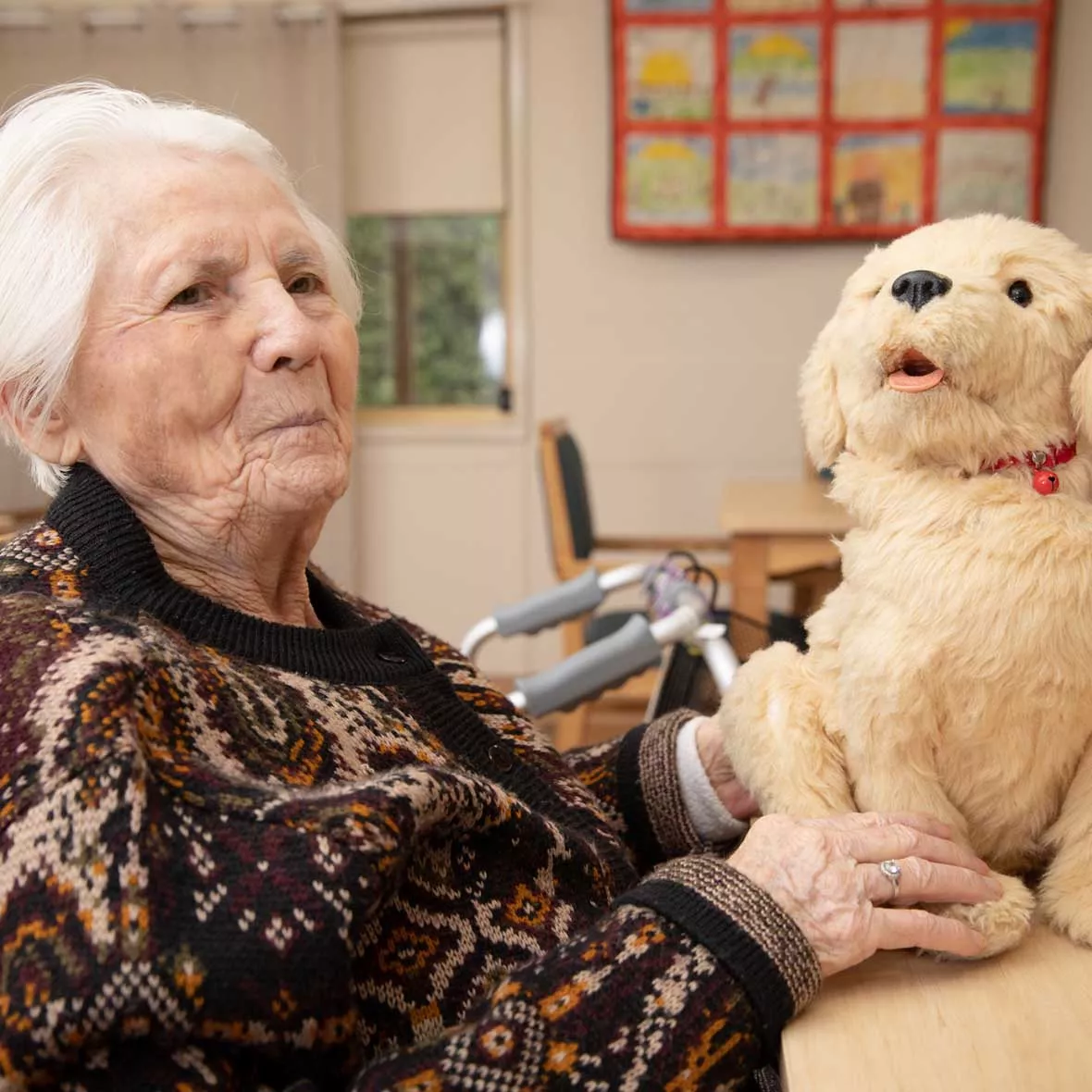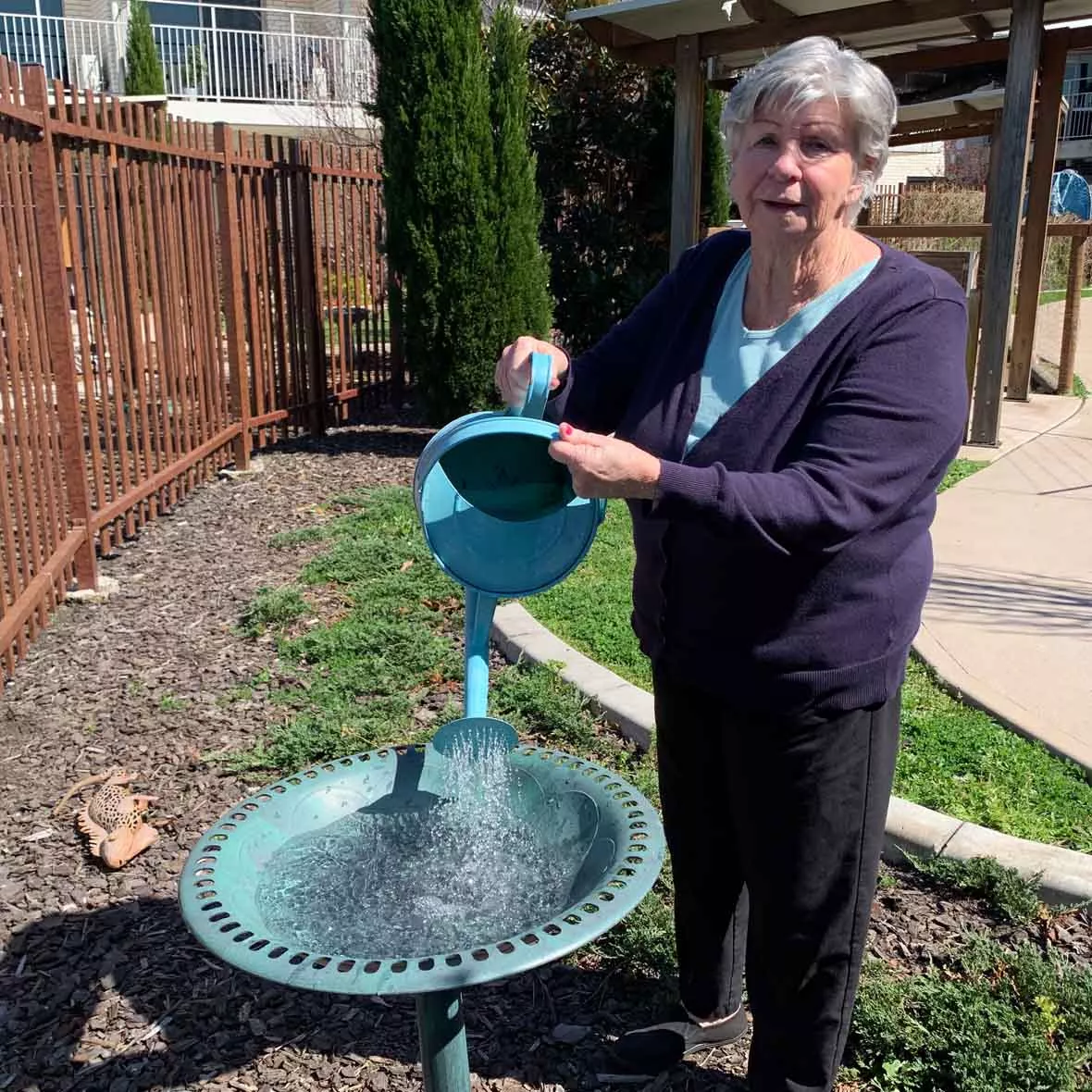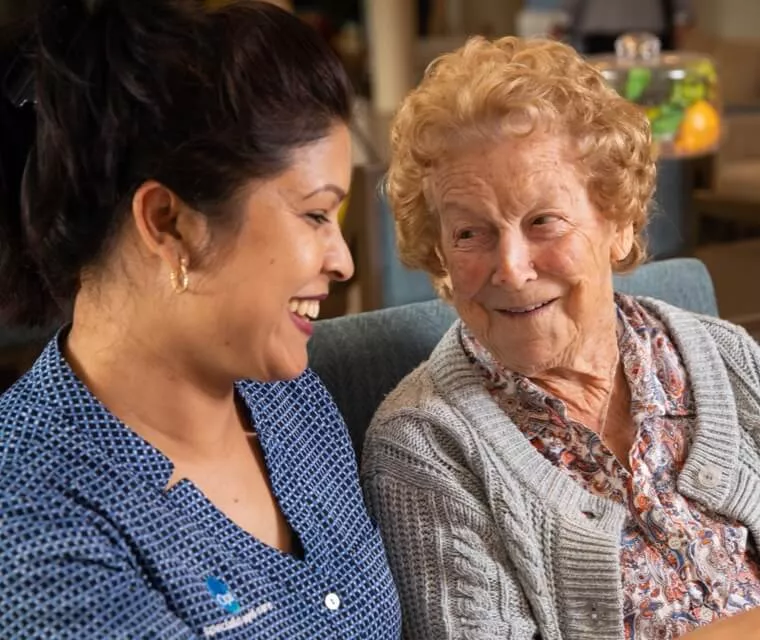
Dementia Care
We care for residents living with dementia every day and are dedicated to providing high quality care. We do this by creating Care Communities that support the needs of each individual. Our aim is for residents to live with purpose and meaning, in a homely environment where they feel safe and at ease and have the opportunity to be as mobile and independent as possible.
It is important that residents have opportunities to contribute in the Care Community through activities that are meaningful to them.
All of these things are essential to nurturing social, physical and mental wellbeing.
We have a registered nurse on every shift, 24 hours a day, along with a team of carers focused on building connected relationships with each resident. Care is all about knowing who our residents are and understanding what matters to them helps us to give better, more personalised care.

Individuals living with dementia can continue to live active and rich lives many years after diagnosis and as a community we support them to live well.
We offer different ways to engage in life in meaningful ways, such as music or art therapy. Many of our Care Communities have activity stations and sensory gardens designed specifically for people living in our Memory Care Neighbourhoods.
We embrace the opportunities that technology offers to enhance the lives of residents. Each Care Community has companion e-pets - endorsed by dementia care experts - that provide comfort and pleasure for residents. We also have augmented reality programs, offering sensory stimulation and new ways for residents to connect with one another using the latest interactive technology.
Let us answer your questions and which of our Care Communities can offer you the support that you need.
What is Dementia?
Dementia describes a collection of symptoms that are caused by disorders affecting the brain. In other words, it isn't one specific disease.
The symptoms cause a progressive decline in the ability to think and perform everyday tasks. It can also lead to changes in personality and behaviour.
Some common symptoms include:
- Memory loss
- Challenges in planning or solving problems
- Difficulty completing everyday tasks
- Confusion about time or place
- Trouble understanding visual images and spatial relationships
- Difficulty speaking or writing
- Misplacing things and losing the ability to retrace steps
- Decreased or poor judgement
- Withdrawal from work or social activities
- Changes in mood and personality
Understanding what is dementia and the symptoms associated with each type can help in ensuring each person’s care needs are met. It is important to remember that no two people experience it in the same way.
What are the Different Types of Dementia?
There are many types of dementia, but the most common causes include Alzheimer’s disease, Vascular, Frontotemporal, and Lewy bodies. Understanding the symptoms associated with each can help in ensuring each person's care needs are met. It is important to remember to no two people experience dementia in the same way.

Person-centred care
Person-centred care is at the heart of our approach to care. It means supporting our residents to live a meaningful life every day in a personalised and considered way.
Learn more
Planning ahead for a new home
Planning ahead helps with your loved ones future, and putting things in place to make them feel comfortable. This includes establishing a new home.
Learn more
Memory care neighbourhoods
In some of our Care Communities we have areas known as Memory care neighbourhoods (MCN). They are a safe designated area or cluster of rooms where residents living with dementia reside.
Learn more
Understanding Dementia webinars
Opal HealthCare's Head of Dementia Care, Dr Simon Pedzisi, DBA, hosts the Dementia Care Connections webinars to discuss the topic of dementia, its common symptoms, its impact on individuals and how you can support someone living with dementia.
Register for upcoming webinars
Living with Dementia - Case Studies
Our case studies take a look at 'Designing dementia care around individual needs', 'Transitioning into care' and 'Enabling meaningful connections' for those in our care who are living with dementia.
Learn more
5 Steps into Residential Aged Care

Assess
Make sure the person requiring care has had an ACAT assessment.

Find
Search for a residential aged care home suitability located.

Costs
Understand the costs associated with aged care.

Apply
Ensure you have all the relevant paperwork.

Move
Check out our moving checklist to ensure the smoothest move possible.
Commonly asked questions about dementia care
-
Dementia isn’t a single disease, but a term used to describe the symptoms of a range of illnesses which cause a progressive decline in the ability to think and perform everyday tasks. It can also lead to changes in personality and behaviour. While there is no cure for dementia, it’s important to keep in mind that it is possible to continue to maintain a good quality of life for many people. For more information, click here.
-
There are many types of dementia but the most common causes include Alzheimer’s disease, vascular dementia, frontotemporal dementia and dementia with Lewy bodies. Understanding the symptoms associated with each type of dementia can help in ensuring each person’s care needs are met.
-
Thinking about the move into residential care is never easy and can bring up all sorts of emotions. It’s time to start the conversation about moving into care when you have concerns that your loved one isn’t coping well with day-to-day activities or if you feel safety is a concern. The earlier you start the conversation, the more time everyone will have to consider options and make informed decisions.
-
Dementia has a huge impact not only on the person who has been diagnosed, but also on those closest to them. Some of the feelings commonly experienced by carers include guilt, grief, loss and even anger. Even if your loved one isn’t ready to move into long-term care, feel free to arrange for a chat with our knowledgeable team who’ll be happy to offer advice or put you in touch with other carers who are going through the same thing and can offer support and understanding.
-
Think about a short stay in respite care to start with. Perhaps arrange to go and have lunch or participate in an activity that your loved one enjoys. This will give you both a chance to find out if the Care Community feels like a good fit and it will give you both confidence in your decision.
It’s natural to feel apprehensive about making such a big decision. It’s important to remember that you’re not alone. Our team understands that it can feel overwhelming and they can provide direct support and suggest strategies to make things easier.
-
Moving house is among the most stressful life events. When moving house is combined with a big life change like moving into residential care, it can have a significant impact. Often the move into care comes about as a result of a traumatic event such as a fall rather than a considered decision process, so the circumstances around the move can feel overwhelming and out of the person’s control. Sometimes the person moving into care can take out their frustrations on their family if they don’t feel in control. It’s important to ensure that your loved one feels a part of the decision making process. If this happens, try not to take it personally. Our team are here to help and support both you and your loved one through this time.
-
Everyone’s different but on average you can expect most people to start feeling more comfortable and at home in around two to six weeks. It’s a big adjustment so try not to get disheartened if it seems to take a while. The most important thing is to just take each day at a time and speak with our leadership team if you have any concerns.


